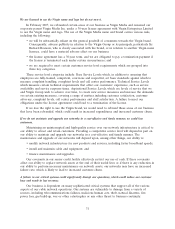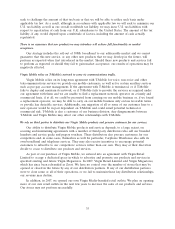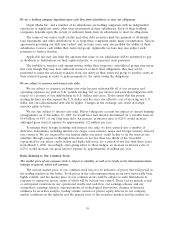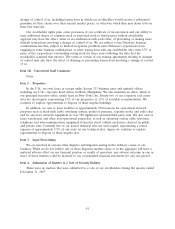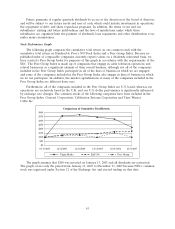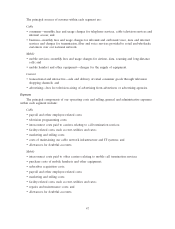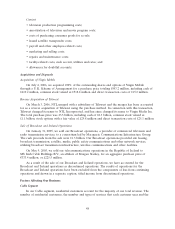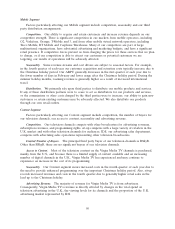Virgin Media 2007 Annual Report Download - page 42
Download and view the complete annual report
Please find page 42 of the 2007 Virgin Media annual report below. You can navigate through the pages in the report by either clicking on the pages listed below, or by using the keyword search tool below to find specific information within the annual report.telecommunications stocks, changes in capital markets that affect the perceived availability of capital to
communications companies, governmental legislation or regulation, currency and exchange rate
fluctuations, as well as general economic and market conditions, such as recessions. Trends in this
industry are likely to have a corresponding impact on the price of our common stock.
We may in the future seek to raise funds through equity offerings, which could have a dilutive effect on our
common stock.
In the future, we may determine to raise capital through offerings of our common stock, securities
convertible into our common stock, or rights to acquire these securities or our common stock. In any
case, the result would ultimately be dilutive to our common stock by increasing the number of shares
outstanding. We cannot predict the effect this dilution may have on the price of our common stock.
We have not historically paid cash dividends on our common stock, we may not be able to continue to pay
dividends, and the failure to do so could adversely affect our stock price.
Until June 2006, we had not paid any cash dividends on our common stock. The terms of our
existing indebtedness limit our ability to pay dividends from cash generated from operations. We may
be unable to continue to pay cash dividends on our common stock.
Sales of stock by stockholders in the company may decrease the price of the common stock.
Based on SEC filings to date, the Virgin Group beneficially owns 10.5% of our issued and
outstanding common stock; in addition, RiverSource Investments, LLC beneficially owns 10.3%,
Franklin Mutual Advisers, LLC beneficially owns 9.7%, SRM Global Master Fund Limited Partnership
beneficially owns 9.1% and Glenview Capital Management, LLC beneficially owns 5.0%, of our issued
and outstanding common stock. Each of these significant stockholders could have an influence over the
business and affairs of our company.
Some of our stockholders also have rights, subject to various conditions, to require the company to
file one or more registration statements covering their shares, or to include their shares in registration
statements that the company may file for itself or on behalf of other stockholders.
Subsequent sales by any of these stockholders of a substantial amount of the company’s common
stock may significantly reduce the market price of the common stock of the company. Moreover, the
perception that these stockholders might sell significant amounts of such common stock could depress
the trading price of the company’s common stock for a considerable period. Sales of the company’s
common stock, and the possibility of these sales, could make it more difficult for the company to sell
equity, or equity related securities, in the future at a time, and price, that it considers appropriate.
Provisions of our debt agreements, our stockholder rights plan, our certificate of incorporation, Delaware law
and our contracts could prevent or delay a change of control of us.
We may, under some circumstances involving a change of control, be obligated to repurchase
substantially all of our outstanding senior notes and repay our outstanding indebtedness under our
senior credit facility and other indebtedness. We or any possible acquirer may not have available
financial resources necessary to repurchase those notes or repay that indebtedness in those
circumstances.
If we or any possible acquirer cannot repurchase those senior notes or repay our indebtedness
under our credit facilities and other indebtedness in the event of a change of control of us, the failure
to do so would constitute an event of default under the agreements under which that indebtedness was
incurred and could result in a cross-default under other indebtedness that does not have similar
provisions. The threat of this could have the effect of delaying or preventing transactions involving a
40



